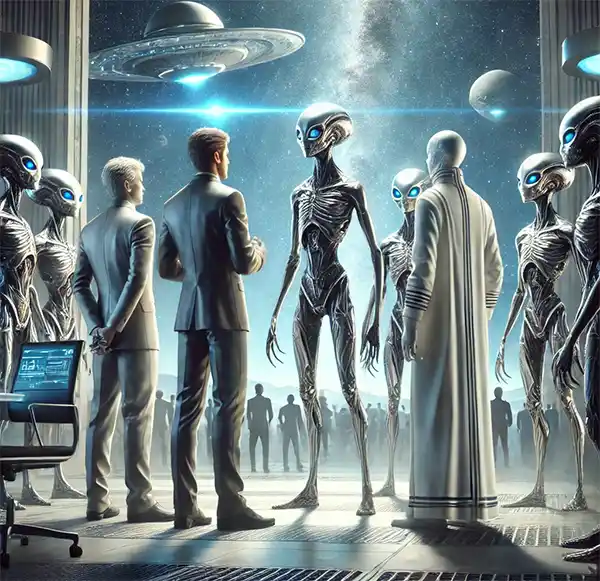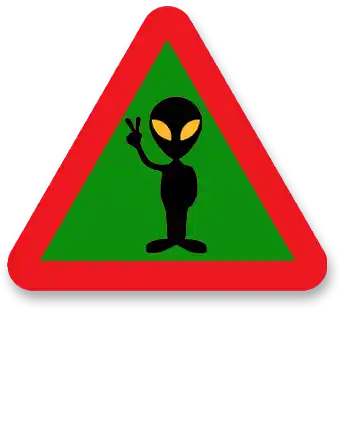Are We Ready for the Truth?
Every year on March 15th, those with their eyes on the skies and their minds open to the unknown celebrate World Contact Day—a day devoted to the possibility (or inevitability?) of first contact with extraterrestrial life. While some might argue that it hasn’t happened yet, others whisper that the truth is out there, just hidden behind government red tape, secret bunkers, and suspiciously vague press conferences. Whether you’re a skeptic, a believer, or just someone who enjoys the idea of little green men sending us a cosmic “what’s up?”, World Contact Day is the perfect occasion to speculate, ponder, and—just in case—send a friendly greeting into the cosmos.
A Brief History of World Contact Day
World Contact Day originated in 1953, thanks to the International Flying Saucer Bureau (IFSB)—a now-legendary group of UFO enthusiasts who decided it was time to stop waiting for aliens to make the first move. Instead, they attempted something bold: a coordinated, worldwide telepathic message sent out to any extraterrestrial civilizations who might be listening. The message, simple yet profound, read:
“We are your friends, and we wish you to come and meet with us.”
It was essentially the first cosmic cold call. The IFSB, led by Albert K. Bender, believed that if humanity reached out with sincerity, extraterrestrials would be more likely to respond in kind. Members from around the world focused their thoughts simultaneously, aiming to send a telepathic beacon across the stars. While no spaceship landed on the White House lawn that day (as far as we know), the event fueled a surge of UFO enthusiasm in the 1950s, inspiring books, research, and the growing belief that first contact was just around the corner.
The idea of a collective outreach resonated deeply with the public, and over the years, World Contact Day has evolved. While the original telepathic approach may not have yielded immediate results, the concept of seeking connection with extraterrestrial life has taken new forms. Scientists now rely on radio signals, space telescopes, and AI-driven scans to analyze deep-space anomalies, all in the hope of detecting a whisper from the void. Even NASA has gotten involved, launching messages like the Golden Record on Voyager 1 and 2, which carry music, greetings, and Earth’s greatest hits into interstellar space—just in case someone out there is listening.
 While skeptics may roll their eyes, true believers see World Contact Day as an opportunity not only to look to the stars but also to reflect on what kind of message humanity is sending out into the cosmos. If aliens did hear us, would they find us worthy of a visit? Or would they do a quick planetary U-turn and head in the opposite direction?
While skeptics may roll their eyes, true believers see World Contact Day as an opportunity not only to look to the stars but also to reflect on what kind of message humanity is sending out into the cosmos. If aliens did hear us, would they find us worthy of a visit? Or would they do a quick planetary U-turn and head in the opposite direction?
The Theories (and Conspiracies)
The question of whether we’re alone in the universe has been pondered for centuries, but modern science (and a healthy dose of internet-fueled paranoia) has only made it more intriguing. Here are some of the most popular theories surrounding extraterrestrial life:
- The Fermi Paradox: If the universe is so vast, where is everybody? Statistically speaking, there should be millions of intelligent civilizations out there, yet we’ve received zero confirmed “hello” signals. Theories range from the idea that advanced civilizations self-destruct before achieving deep space travel to the unsettling possibility that something out there is deliberately keeping us in the dark.
- The Zoo Hypothesis: What if aliens already know about us but are simply observing from a distance, treating Earth like a giant intergalactic nature reserve? If this is true, let’s hope they’re enjoying the show and not waiting for the series finale.
- Government Cover-Ups: From Roswell to the Pentagon’s UFO disclosures, some believe that world governments already have knowledge of alien encounters but choose to keep it classified. Are they protecting us from mass hysteria, or are they just bad at sharing?
- They’re Already Here: Could extraterrestrials be living among us, disguised as humans? Some conspiracy theorists suggest that world leaders, celebrities, or that slightly too-charming neighbor down the street might not be entirely from this planet. (If Jeff Bezos turns out to be a reptilian, we can’t say we weren’t warned.)
How to Celebrate World Contact Day
While you may not have access to a spaceship or classified alien files, there are plenty of ways to get into the spirit of World Contact Day:
- Send Your Own Message to Space: Organizations like SETI (Search for Extraterrestrial Intelligence) have spent decades scanning the skies for signals. Why not join in and beam a message into the cosmos? Just keep it friendly—we don’t need an intergalactic misunderstanding.
- Host a Sci-Fi Movie Marathon: Celebrate the day with classics like Close Encounters of the Third Kind, E.T., or the not-so-friendly Independence Day—just in case first contact goes sideways.
- Stargazing and Sky-Watching: Whether you believe in UFOs or not, a night spent watching the stars is never wasted. You might just see something unusual… or at least a very convincing drone.
- Discuss the Possibilities: Gather with fellow enthusiasts (or tolerant friends) to debate theories, trade alien encounter stories, and maybe even come up with your own ideas for what first contact might look like.
What Would Happen?
Let’s say, hypothetically, that World Contact Day works, and aliens show up tomorrow. What next?
- Best Case Scenario: They’re friendly, way smarter than us, and generously share advanced technology that fixes climate change, eliminates disease, and makes Wi-Fi free and universally available. Humanity enters a golden age of progress and intergalactic tourism.
- Neutral Scenario: They’re just passing through, give Earth a casual nod, and move on, leaving us collectively disappointed but relieved.
- Worst Case Scenario: They’re not friendly, and suddenly, all those sci-fi invasion movies don’t seem so far-fetched. Hopefully, Will Smith is available to save us.
Keep Watching the Skies
World Contact Day is a lighthearted yet thought-provoking reminder that we live in an enormous, mysterious universe. Whether you believe we’re alone or that extraterrestrials are just waiting for the right moment to drop by, one thing is certain: the search for answers is far from over. Until then, keep looking up—you never know when the universe might decide to answer back.
Happy World Contact Day! And if you see something strange in the sky, maybe it’s time to finally upgrade that old flip phone and capture some HD evidence.
Please Share our Content






 While skeptics may roll their eyes, true believers see World Contact Day as an opportunity not only to look to the stars but also to reflect on what kind of message humanity is sending out into the cosmos. If aliens did hear us, would they find us worthy of a visit? Or would they do a quick planetary U-turn and head in the opposite direction?
While skeptics may roll their eyes, true believers see World Contact Day as an opportunity not only to look to the stars but also to reflect on what kind of message humanity is sending out into the cosmos. If aliens did hear us, would they find us worthy of a visit? Or would they do a quick planetary U-turn and head in the opposite direction?








 "Sláinte!" is a traditional Irish expression used as a toast, equivalent to "Cheers!" in English.
"Sláinte!" is a traditional Irish expression used as a toast, equivalent to "Cheers!" in English.